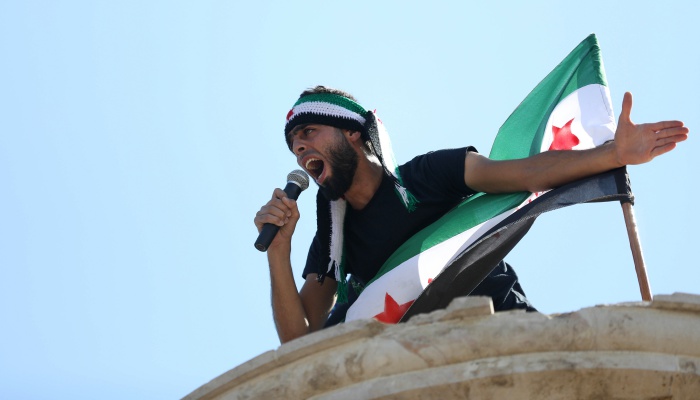Syrian rebels on Sunday denied pulling any heavy arms out of a major opposition bastion in the north, as the deadline to implement a demilitarization deal there draws closer, AFP reported.
Regime ally Moscow and rebel backer Ankara agreed earlier in September to create a buffer zone around the opposition stronghold of Idlib that would be free of both jihadists and heavy arms.
The deal has so far averted a massive assault on the region by Syrian President Bashar al-Assad’s government, but its implementation is expected to be complex.
The National Liberation Front (NLF), a pro-Turkey rebel alliance, welcomed the agreement but said Sunday it had not yet moved any heavy arms from the planned zone.
“There have been no withdrawals of heavy weapons from any area or any front. This report is denied, completely denied,” NLF spokesman Naji Mustafa told AFP.
The Syrian Observatory for Human Rights had earlier said one faction of the NLF began withdrawing its heavy weapons under the Turkish-Russian agreement.
It said Faylaq al-Rahman, whose fighters number between 8,500 and 10,000, were leaving three towns in the planned buffer zone on Sunday “with heavy weapons, including tanks and cannons.”
The Britain-based monitor uses a vast network of sources including fighters, officials and medical staff.
A spokesman for al-Rahman also told AFP on Sunday it had not moved any forces or arms.
“There have been no changes in the location of weapons or redistribution of fighters, even as we remain committed to the agreement reached in [the Russian resort of] Sochi,” said Sayf al-Raad.
On Sept. 17, Russian President Vladimir Putin and his Turkish counterpart Recep Tayyip Erdoğan agreed to set up a demilitarized zone about 15 to 20 kilometers wide skirting Idlib.
Under the agreement, all factions in the planned buffer area must hand over their heavy weapons by Oct. 10 and radical groups must withdraw by Oct. 15.
The deal was welcomed by world powers, aid organizations and the United Nations, which all hoped it would help avoid a bloody military assault on the area.
But observers have pointed out its implementation would be tricky for Ankara.
Most of the territory where the zone would be established is controlled by either hardline jihadists or by Hayat Tahrir al-Sham (HTS), which is led by former members of al-Qaeda’s Syria branch and widely considered the most powerful force in Idlib.
The rest is held by the NLF and other rebels.
HTS has yet to announce its position on the agreement, and there have been no signs it was moving out either fighters or heavy weapons.
But al-Qaeda loyalists Hurras al-Deen, which have a presence in the zone, rejected the deal last week.
And on Saturday, formerly US-backed rebel group Jaish al-Izza followed suit.
“We are against this deal, which eats into liberated [rebel-held] areas and bails out Bashar al-Assad,” its head Jamil al-Saleh told AFP.
Jaish al-Izza, which is not part of the NLF, clashed with regime forces throughout the night on Saturday and into Sunday in the province of Hama, bordering Idlib.

